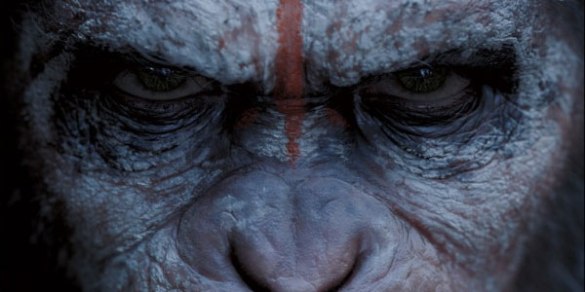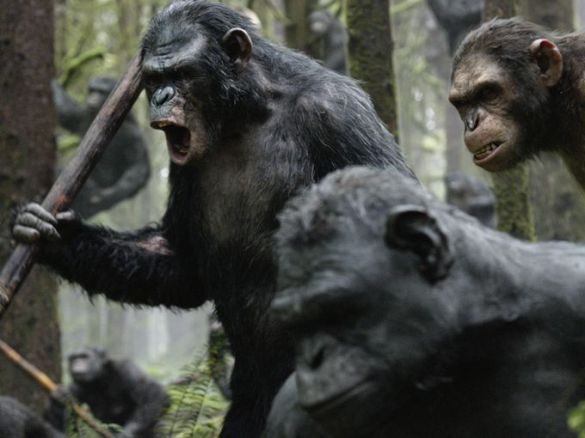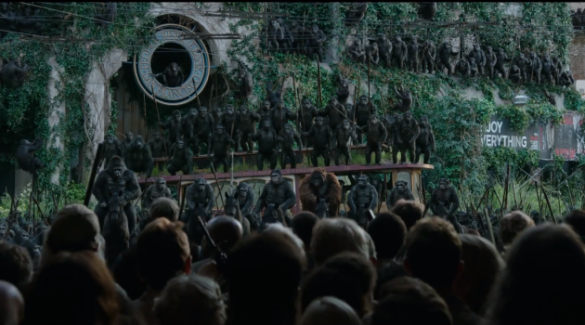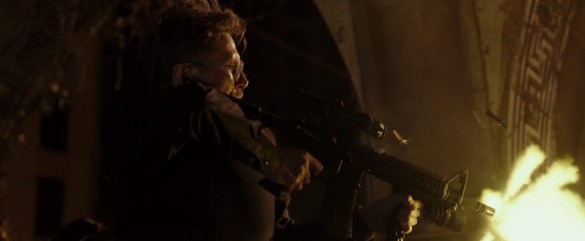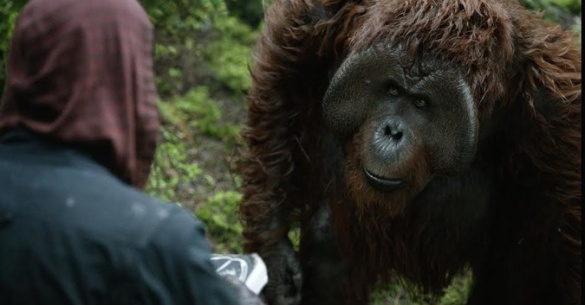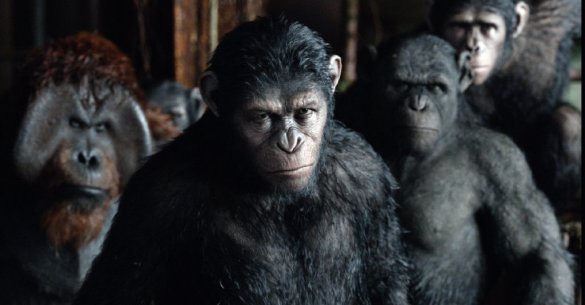It is fascinating to watch the goals and underlying social themes shift in the Planet of the Apes series. I’ll come out and say it. I love the series. The original Planet of the Apes from 1968 starring Charlton Heston is one of my favorite movies. Definitely one of my favorites from the sixties. I just got out of a showing of Dawn of the Planet of the Apes (2014), the latest incarnation and direct sequel to Rise of the Planet of the Apes (2011). Without hesitation, Dawn is the new second best Planet of the Apes movie.
For starters, I should begin by mentioning that I saw it in Korea and, while the dialogue was in English, whenever the apes were signing things the subtitles were all in Korean. At first I was concerned I might be missing crucial plot points, but kudos to the amazing effects team at WETA and the motion-capture performers for making silent ape dialogue wholly understandable. I feel bad for the 5 year old Korean girl who sat next to me and buried her terrified face in her hands for the film’s duration.
Our story begins where Rise left off. The intellectually enhanced and organized ape revolutionaries had escaped into the forests beyond the Golden Gate Bridge. An infected pilot, unwittingly carrying a deadly virus developed in a lab, embarked on a tragic journey that would effectively spread the disease to every corner of the world, wiping out a majority of Earth’s human population and all semblance of order and civilization. Now, several years later, the humans live in a tribal post-apocalyptic nightmare and are quickly running out of power and means to utilize their limited resources. Meanwhile, ape society is flourishing in the wilds and a developing culture is forming strong social bonds. Caesar is the leader of the apes.
The troubles in this movie begin when humans stumble into ape territory in search of a lost dam that might help restore power to their ailing ruins of society. A shot is fired and a chimpanzee is hit. Caesar, rather than having his mighty army make short work of the lost search party, shows mercy and banishes them. This introduces the conflict that is firmly seated at this movie’s core: trust and tribal bonds. Caesar has a clear duty to protect his people (and he, and the rest of the chimpanzees, bonobos, gorillas, and orangutans harbor an understandable fear and hatred of humans—*see previous film) and the humans have a clear duty to themselves to protect their own and get the power back to avoid more violent anarchy. Communication proves difficult for no matter how well-intentioned some peace-seeking individuals on either side of the table are, it only takes a few reckless or wicked individuals to keep tensions high and trust destroyed.
The movie is intelligently written, well acted, and like the previous film features some top-notch computer special effects and spectacular action scenes. I really liked Rupert Wyatt’s Rise of the Planet of the Apes, but in all honesty Matt Reeves’ Dawn of the Planet of the Apes is easily the superior film. Rise was great, but I had a few problems with it (mainly archetypal cartoony human characters like the evil money-loving bureaucrat, the benevolent scientist, the ape racist who works with apes, the girl, etc.). Thankfully, most of the problems are corrected in Dawn. The strongest chapter of Rise was the ape sanctuary scenes where Caesar, an intellectually superior animal, has to learn real ape society rules and rise to power to become their leader. With almost no dialogue or humans, the film soars to fascinating heights and keeps the tension building in these impressively animated sequences. Dawn plays like an extension of those scenes and centers around the apes cultivating their own society, while the human subplot focuses on mankind desperately trying not to slip back to the dark ages.
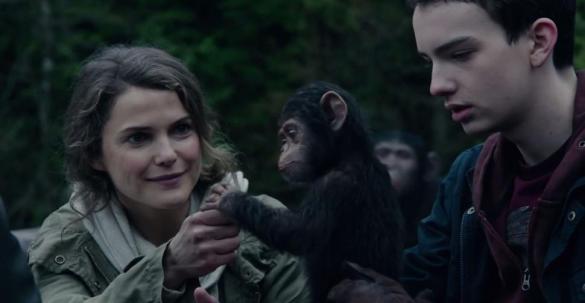
And then all the dogs and cats in the hotel sing “If I Had Words” to the tune of Camille Saint-Saëns’ Symphony No.3 in C minor.
Rise, perhaps, put a little too much into the fun fan-service of referencing the 1968 classic. Without knowing what the signed ape dialogue was specifically, I don’t think I saw much evidence of this in this new film. The only reference might be the music which did remind me strongly of the original in places. Dawn still has a weaker human storyline, but their role is vital for the story. Dawn is about establishing peace and trust in a volatile situation. Mankind itself is not the enemy. There are a few cartoonishly dickish humans who muck up the works more than a few times, but they are symbols of the fear and closed-mindedness that is also present in the ape society. Koba, a chimpanzee (or bonobo, who knows?), is the real villainous foil. His fear, anger, and hatred—regardless of how personally justified or rooted in past experiences—stands for the fear, hatred, and self-interest that blocks cultural progress everywhere.
Questions:
1. Where did the apes get the horses?
2. What are the ape sentiments toward monkeys and tarsiers? Slow lorises?
3. Why no gibbons? Gibbons are apes.
4. Not a question, but we were so close to seeing a bear fight a gorilla in the first 10 minutes! So close! And they blew it by having it fight some chimps.
5. Why aren’t there more orangutans? I love orangutans.
6. Why is it apes versus humans? Humans are technically apes too. The title “Planet of the Apes” is actually not that descriptive. We currently live in the “Planet of the Apes.”
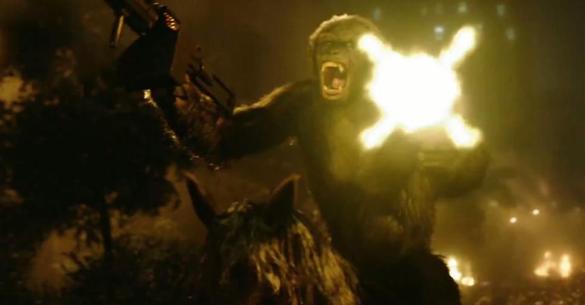
Raging chimpanzee firing two machine guns while riding a horse. If that doesn’t make you want to see this nothing will.
I said at the beginning that what I find interesting is how the same series can change its tone and message with the shifting of the cultural tides yet still operate under the same basic rules. The original Planet of the Apes from 1968 was about dogmatism versus science and the possibilities of the collapse of human society and the possible future of ape evolution. Beneath the Planet of the Apes (1970) was about making more money. That’s about it. A little bit concerning the dangers of nuclear weapons at the end. Escape from the Planet of the Apes (1971) dealt with how we react to outsiders and how we defend our own self interest at the expense of outsiders (because they be different!). Conquest of the Planet of the Apes(1972) was about racism and revolution. Battle for the Planet of the Apes (1973) was about making money again, but also about how some of the best social rules must sometimes be compromised or broken to keep the peace (hit on again in Dawn—one very appropriate nod the earlier movies). The Tim Burton one (2001) was about “remember these movies?” Rise of the Planet of the Apes (2011) shifted tone to be about scientific ethics and perhaps ecology, especially in how we treat animals. It asked questions like: Is it okay to treat animals the way we do simply because we don’t perceive them to be on our intellectual level? Are we really the most important species? Could another surpass us? Dawn of the Planet of the Apes (2014) focuses much of its energy on the tenuous nature of diplomacy in hostile territory where emotions run high. It basically states that emotion should not rule the roost when it comes to maintaining peace—and that this message rings strongly for both sides. In a sense, Dawn is a critique on the hazards of nationalism and isolationism and how it only takes a few extremists to characterize and demonize an entire social group. It is easy to see how a simple tit for tat exchange can escalate quickly to tragic ends. This is something we witness throughout history and today in human geopolitics and conflicts.
Moral of the story: peace is hard and destruction is easy.
All in all Dawn of the Planet of the Apes is probably one of the more socially significant blockbusters out there at the moment. It suffers from some less interesting human characters (minus Gary Oldman who manages to be more than the archetype you might expect from the trailers). The effects are mesmerizing to watch and the fight sequences are high octane, high emotion thrill-scapes. If you enjoyed anything about the earlier films this is a welcome treat with a bigger brain than most of the series and what appears to be a genuinely prescient conscience concerning escalating real-world geopolitical tensions. I recommend it.
Picture references:
http://www.truemovie.com/2014moviedata/DawnofthePlanetoftheApes.htm
http://herocomplex.latimes.com/books/firestorm-dawn-of-the-planet-of-the-apes-prequel-novel/#/0

